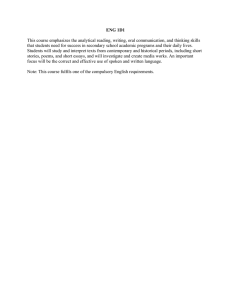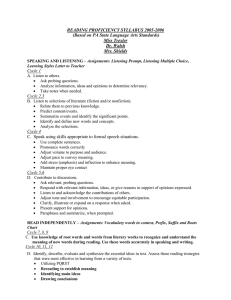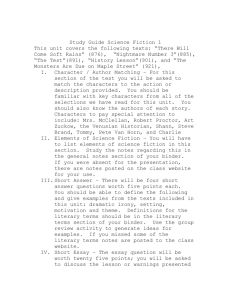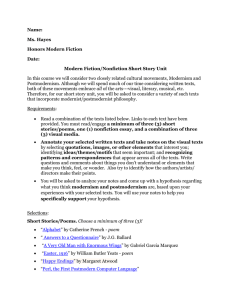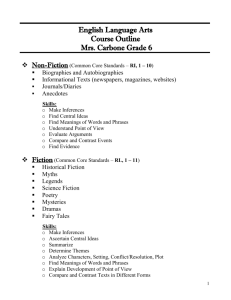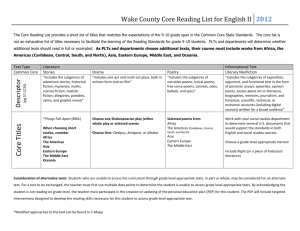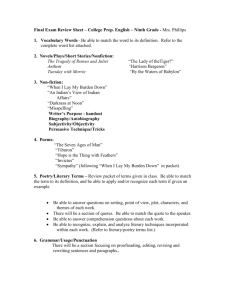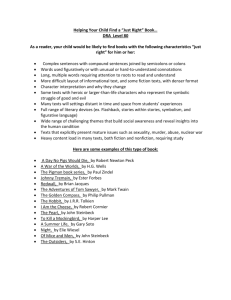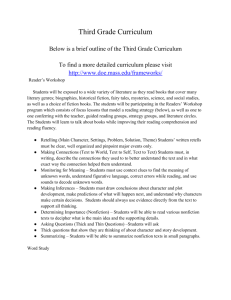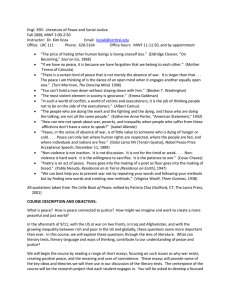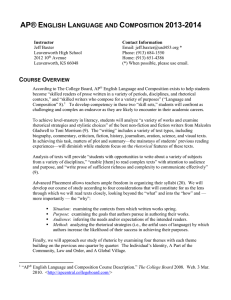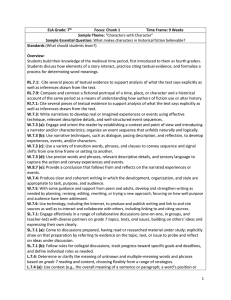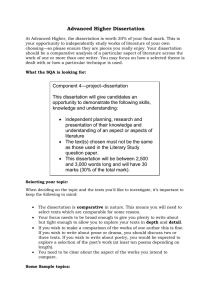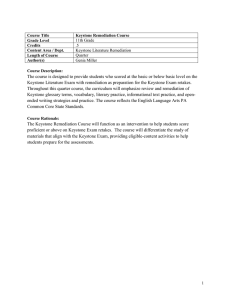6th Grade Reading Syllabus Broad Meadows Middle School Mrs
advertisement
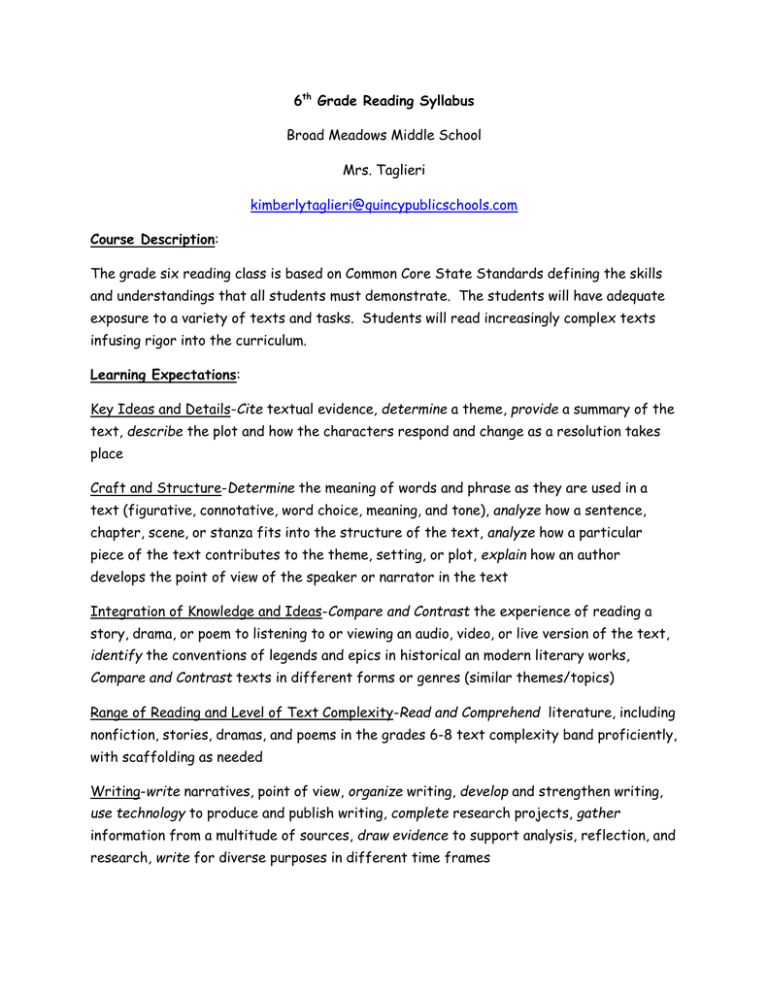
6th Grade Reading Syllabus Broad Meadows Middle School Mrs. Taglieri kimberlytaglieri@quincypublicschools.com Course Description: The grade six reading class is based on Common Core State Standards defining the skills and understandings that all students must demonstrate. The students will have adequate exposure to a variety of texts and tasks. Students will read increasingly complex texts infusing rigor into the curriculum. Learning Expectations: Key Ideas and Details-Cite textual evidence, determine a theme, provide a summary of the text, describe the plot and how the characters respond and change as a resolution takes place Craft and Structure-Determine the meaning of words and phrase as they are used in a text (figurative, connotative, word choice, meaning, and tone), analyze how a sentence, chapter, scene, or stanza fits into the structure of the text, analyze how a particular piece of the text contributes to the theme, setting, or plot, explain how an author develops the point of view of the speaker or narrator in the text Integration of Knowledge and Ideas-Compare and Contrast the experience of reading a story, drama, or poem to listening to or viewing an audio, video, or live version of the text, identify the conventions of legends and epics in historical an modern literary works, Compare and Contrast texts in different forms or genres (similar themes/topics) Range of Reading and Level of Text Complexity-Read and Comprehend literature, including nonfiction, stories, dramas, and poems in the grades 6-8 text complexity band proficiently, with scaffolding as needed Writing-write narratives, point of view, organize writing, develop and strengthen writing, use technology to produce and publish writing, complete research projects, gather information from a multitude of sources, draw evidence to support analysis, reflection, and research, write for diverse purposes in different time frames Speaking and Listening-Engage effectively in a range of collaborative discussions (one-onone, groups, and teacher-led)-students will be prepared, follow rules, set goals and deadlines, and define roles, students will respond and make contributions that contribute to the topic or issue, students will demonstrate understanding through reflection and paraphrasing, interpret information in various media and formats, delineate a speaker’s argument and claims-to examine if the claims are supported by evidence and reasons, present claims and findings, include multimedia components, adapt speech to the different contexts Texts: The Language of Literature, Vistas (different levels of complexity), Read for Real, and Word Wisdom for vocabulary enrichment A variety of texts are incorporated into the curriculum which may include the following: Stargirl, The Revealers, Schooled, Bridge to Terabithia, Holes, Esperanza Rising, Lily’s Crossing, The Watson’s Go to Birmingham, The View From Saturday, Journey Home, Stranger With My Face, Down A Dark Hall, Maniac Magee, Hatchet, Chasing Vermeer, The Road Not Taken, Dragonwings, Roll of Thunder, Hear My Cry, The Diary of Anne Frank, and Letter from Birmingham Jail. Additional nonfiction and fiction texts will be employed, as well as newspapers, magazines, literary essays, and internet resources that allow the students to study the topics and themes in depth. Classroom Materials: The following material should be brought to class EVERY DAY. Agenda, pencil, notebook, folder, highlighter, black or blue pen, covered novel, coloring utensils, and homework Major Topics: Stories: adventure, historical fiction, mysteries, myths, science fiction, realistic fiction, allegories, parodies, satire, and graphic novels Drama: one-act and multi-act plays; written form and in the form of film Poetry:4 narrative poems, lyrical poems, free verse poems, sonnets, odes, ballads, and epics Literary Nonfiction: exposition, argument, personal essays, speeches, opinion pieces, essays about art or literature, biographies, memoirs, journalism, and historical, scientific, technical or economic accounts Grading: Classwork-15% Homework-15% Quizzes-30% Tests-40% Projects and presentations will be counted as quiz or test grades. Homework: Homework may be assigned daily. Students are expected to complete homework on time. Points will be taken off each day an assignment is late. Every assignment must have the correct heading in the top right hand corner-name, date, period, page number (if given). Absence: It is the student’s responsibility to complete all assignments and assessments that are missed. The length of time to make up an assignment should correlate to the amount of time the student was absent. Formal and Informal Assessments: Quizzes, Tests, Homework, Classwork, Class Participation, Projects (individual and group), Constructed Responses, Essays, Arguments, Types of Writing, Oral Presentations, Research Projects, Summarizing, Paraphrasing, Comprehension Questions, and Claims Extra Help: Extra help is offered before and after school. Please make an appointment ahead of time to make sure that I am available.
